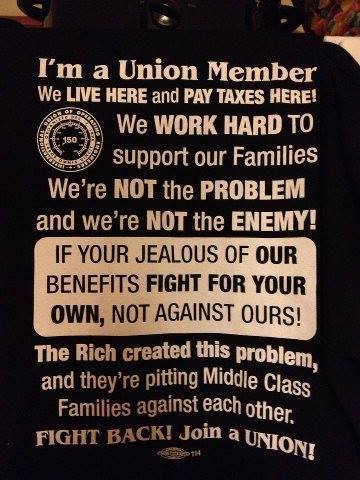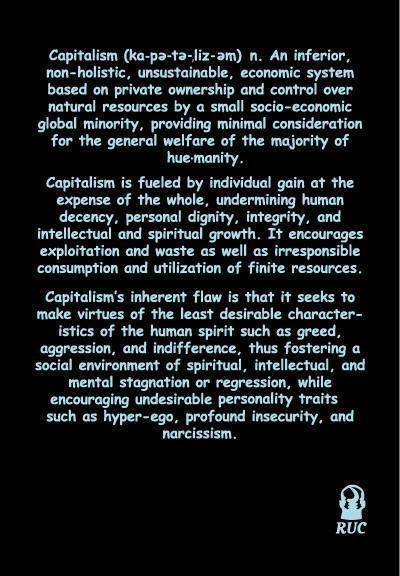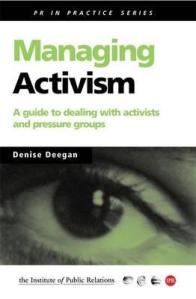 Public Sector Union’s have been piggy-backing on alot of messaging from other types of unions lately…Even as public opinion continues to turn against the labour movement as a whole, maybe we can try to recall that organized labour was once a great political force that was poised to change society for everyone.
Public Sector Union’s have been piggy-backing on alot of messaging from other types of unions lately…Even as public opinion continues to turn against the labour movement as a whole, maybe we can try to recall that organized labour was once a great political force that was poised to change society for everyone.
However the anti-communist era, and the enormous concessions given to the most powerful unions, all but assured that this deeper political force would be channeled into simply satisfying the needs of it’s membership, rather than meddling with how the public could better see the risks and benefits of free-market capitalism. This image (right-side) is from a Trade Union, but was found on a Wisconsin State AFL-CIO page.
Trade Unions are the organizations that, not so long ago, made great strides to assure workplace safety and better labour relations for workers, because they were so sorely needed at the time. But time have certainly changed quite significantly since then, as we all know.
By contrast, Public Sector workers had historically already enjoyed some of the best job security and safest working conditions in the past half-century, even as organized labour grew among government, education and healthcare workers.
Public Sector Unions (PSU’s) nevertheless still used the same tactics to extort the captive public in order to achieve levels of benefits that are now not only much greater than the social norm, but also not even commensurate with skill-levels (according to national job standards), nor tied to performance or work value (it’s a system based on tenure not merit). Essentially the application of organized labour tactics and CBA’s to the Public Sector has created a privileged class of worker, as defined not only by public opinion, but also based simply on the numbers and job descriptions.
In my opinion, I’m starting to suspect that this, in some ways, is similar to how Communist Party members used their affiliations to become a privileged class in an abusable system that eventually collapsed, because it ran out of ways to pay for itself – basically because it wasn’t sustainable either. But that’s a weak theory about decay, greed and corruption that I’ll leave for another day, to not detract from the current subject. Maybe read “Animal Farm” again for a refresher on human nature, if required.
Extorting Public Opinion
Nowadays, the right-wing is getting better at turning the current state of organized labour against itself. Currently, the large gap between PSU’s and the rest of the public that works to support their CBA’s is now turning into a political leverage point. One that has gained so much visibility that it now be used to divide society and undo the historic gains of the labour movement – by letting politicians with right-wing agendas easily make a case for out how greed and self-interest have become more important to PSU’s than assuring fair-wages and equality for all.
As we know, the PSU’s never really took any truly serious haircuts along with the rest of society to reflect the realities of an economic downturn and the changing conditions in the job market. Nor did they mount any serious public relations and TV campaigns (akin to the TV campaigns that are run during election periods, to counter non-aligned politicians) in order to clearly demonstrate the corruption in the financial systems that have led us to this point.
Now they simply stand out from the rest of society, and don’t even seem to realize this, as they continue to recite propaganda based on 50 year-old achievements and ideals…All while failing to demonstrate accountability to all the current social and economic risks that aren’t even recognized in any of the messaging, let alone addressed by union propaganda with any proposed solutions or clear concessions. All the public really hears in the messaging, is “support us or else” or, “if you don’t like it, then form your own union”. This level of selfish arrogance speaks volumes, and the people saying don’t even seem to realize what they sound like. Being fully indoctrinated is likely the cause.
So regrettably, rather than representing the founding ideals of the Labour Movement, the PSU’s have now come to simply represent greed and self-interest – to many people. Every new CBA process, where the public was held hostage for more gains, while fighting to not at least give up ridiculous benefits like banked sick-days, etc, etc, only further damaged the public opinion of PSU’s. Who cares, right?
This situation is compounded by the fact that membership seems to be failing to see how they are being perceived as simply out of touch with reality, as they adopt misguided dogma that offers simplistic slogans like “the rest of society should also unionize if they are so jealous”. The narrow rhetoric just gets even more ridiculously unrealistic from there, so there’s no point in elaborating.
It’s About the Economy, Stupid!
Meanwhile, as our governments continue to put our grand-children deeper into lifelong debt, people are waking up to the fact that public debt is indeed a form of slavery. Enslavement of the unborn, no less!
It’s a shame that the PSU’s couldn’t figure out how to keep their wages and benefits from becoming a glaring example of inequality, and turning into the greatest cost (by far) of running a tax-funded society. Even though they had already achieved a level of benefit and job security that is far out of touch from present day reality, the public has still seen no clear signs from the PSU’s that organized labour has the interests of the public at heart. Talk is cheap, after all, and most of that talk simply takes on a threatening tone, at the slightest hint that the public might not blindly support “Big Labour” any longer. This also betrays an undercurrent of anti-social self-interest.
Perhaps it’s the labour movement’s organizational and cultural roots in organized crime, that makes extortion and bullying an accepted labour tactic, even today?
The simplistic claim that everyone should be able to extort higher wages/benefits if they were to also unionize as well, isn’t just propaganda designed to distract from the current reality, it’s actually economically unsustainable. Low-skilled or clerical labour cannot be paid the same as skilled professionals across the board, so this flawed logic simply raises wages for everyone, without increasing real wages, since the cost of living will also rise in accordance with higher labour costs. Perhaps if the labour movement had focuses it’s efforts on socializing things like banking, insurance, energy, and agriculture, we’d be in an entirely different position today. But there are many reasons why Labour is selective about what industries it chooses to organize, and to what extent it will ever take any of the risks of actually owning, or at least managing a stake in our shared economy.
Anybody who’s taken highschool economics will remind us that trying to raise all salaries/benefits means you’ll need more money supply, and in economic terms that’s called an inflationary force, and it severely devalues currency for everyone. Of course in the case of PSU’s these increased costs are simply offloaded to public debt, or cuts to other areas of government, like investments in infrastructure, for example. In the private sector, that kind of debt-financing leads to weak bottom lines, and eventually insolvency. Since there isn’t such a large float of tax-revenue that can underwrite billions in debt, out in the real and accountable world of private business.
It’s too bad that Tommy Douglas isn’t around anymore, to remind people why deficit budgets will actually destroy government (society?) in the long run. But by then, the current PSU membership/leadership will have already retired and left someone else holding the bag for their excess.
It’s sad to see how short-sighted and self-interested the labour movement has become. Shameful to see that organized labour has instead become synonymous with selfishness, when it could have helped build a completely different society for everyone. The labour movement was basically bought-off long ago, and neutralized with the complacency that comes from financial gains and security. Thus rendered incapable of producing any real social change…and now the social divide continues to grow as the PSU’s have now turned into a political football that can be used to shift political power…Much as the PSU’s have already tried to direct electoral politics in their own favour already.
TL:DR
In short, I believe that the Labour Movement has let us all down, even as we supported it’s gains with taxes and other social costs. The rest of society has wound up paying for a privileged class, that will eventually be targeted by right-wing politicians seeking to gain public favour, as it becomes more clear that the entire system is unsustainable.





 Katheryne Schulz
Katheryne Schulz